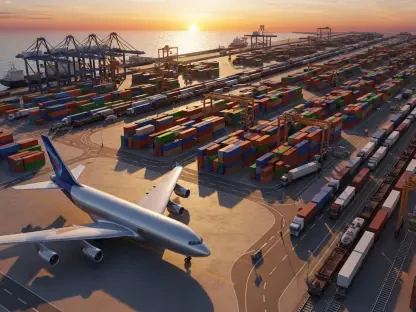Setting the Stage for a Transformative Era
In the heart of the Arabian Gulf, Qatar stands at a pivotal moment in 2025, with its transportation sector poised to redefine regional and global connectivity through groundbreaking advancements. Imagine a nation where electric buses glide silently through bustling streets, smart systems orchestrate seamless traffic flow, and logistics hubs link continents with unparalleled efficiency. This is not a distant dream but the reality Qatar is crafting through its ambitious 2025-2030 Transport Strategy, launched under the inspiring slogan ‘Reaching Beyond Horizons.’ This roadmap promises to elevate the sector into a powerhouse of economic growth, sustainability, and innovation, aligning seamlessly with national development goals.
The current state of Qatar’s transportation industry reflects a blend of rapid progress and untapped potential. Significant strides have been made in infrastructure and public transport, with a notable portion of the bus fleet already electric, setting a regional benchmark. Yet, the challenges of scalability, technological integration, and environmental targets loom large, demanding a strategic overhaul. This industry report delves into how Qatar plans to navigate these complexities, transforming its transportation landscape into a model of excellence.
Core Components of the Strategic Vision
Key Areas of Focus and Initiatives
Qatar’s transportation strategy for 2025-2030 is built on a foundation of economic diversification, sustainability, and technological advancement. The plan prioritizes modernizing infrastructure through extensive road networks, expanded metro systems, and upgraded port facilities to enhance connectivity. A major focus is on green initiatives, with a commitment to fully electrify public transportation fleets by 2030, significantly reducing carbon footprints.
Innovation drives another critical aspect of this vision, with smart technologies at the forefront. The adoption of digital control centers and user-friendly applications aims to optimize traffic management and improve commuter experiences. Safety and accessibility also take center stage, ensuring that transportation systems cater to diverse societal needs, including provisions for the elderly and individuals with disabilities, fostering an inclusive environment.
Customer-centric services round out these priorities, focusing on reliability and comfort in public transit. Initiatives are in place to connect every corner of the nation, ensuring no region is left behind. This comprehensive approach not only addresses immediate needs but also positions Qatar as a leader in forward-thinking transportation solutions.
Financial Commitment and Economic Implications
The financial backbone of this strategy is a substantial investment of QR1.2 billion, spread across 125 projects stemming from 42 distinct initiatives. A noteworthy aspect is the private sector’s role, contributing 40 percent of the funding through a robust public-private partnership model. This collaboration is expected to catalyze innovation and efficiency, leveraging diverse expertise to achieve ambitious targets.
Economically, the transportation sector is projected to play a pivotal role in boosting Qatar’s GDP over the next five years. By enhancing logistics performance and establishing the nation as a global hub, the strategy aims to attract high-quality investments and create new revenue streams. Forecasts suggest a marked increase in sector growth, reinforcing Qatar’s competitive edge in international markets.
Beyond immediate gains, the ripple effects of these investments promise job creation and skill development, particularly in technology-driven fields. This economic momentum is set to strengthen Qatar’s position as a central node in global trade routes, amplifying its influence in the logistics domain.
Navigating Implementation Hurdles
The path to realizing this grand vision is not without obstacles. Funding allocation poses a significant challenge, as balancing resources across numerous projects requires meticulous planning and prioritization. Additionally, integrating cutting-edge technologies into existing systems demands substantial upgrades and expertise, testing the nation’s readiness for rapid digital transformation.
Environmental goals, particularly the push for full electrification by 2030, face infrastructural and logistical barriers. Establishing widespread charging networks and ensuring sustainable energy sources are critical yet complex tasks. Overcoming these issues will necessitate innovative solutions, such as leveraging renewable energy and optimizing urban planning to support green transport.
To address these challenges, Qatar is focusing on legislative reforms, international partnerships, and capacity-building programs. Strengthening regulatory frameworks can facilitate smoother project execution, while global collaborations offer access to best practices and advanced technologies. Equipping the workforce with necessary skills through targeted training initiatives remains a cornerstone for sustainable progress.
Policy Backbone and Regulatory Support
A robust regulatory framework underpins Qatar’s transportation strategy, ensuring alignment with sustainability and safety objectives. Policies are being crafted to enforce strict environmental standards, promoting the adoption of eco-friendly practices across all transport modes. Traffic safety regulations are equally prioritized, aiming to minimize accidents and enhance user trust in public systems.
Compliance plays a vital role in creating an integrated transportation network that prioritizes ecological balance. Government oversight ensures that projects adhere to national development goals while meeting international benchmarks. This structured approach helps in mitigating risks associated with rapid expansion and technological shifts.
Partnerships with stakeholders further bolster these efforts, aligning private and public interests toward common objectives. By fostering a culture of accountability and transparency, Qatar is laying the groundwork for a transportation ecosystem that is not only efficient but also resilient to future challenges.
Emerging Trends and Sector Outlook
Looking ahead from 2025, Qatar’s transportation sector is set to be shaped by digital transformation and smart infrastructure. The rollout of advanced control centers promises real-time monitoring and management, reducing congestion and improving service delivery. Digital applications tailored to user needs are expected to redefine how citizens interact with transportation systems.
Global logistics demands and technological breakthroughs present both opportunities and disruptions. Adapting to evolving trade patterns will be crucial for maintaining Qatar’s hub status, while staying ahead of tech trends ensures competitiveness. The sector must remain agile to incorporate innovations like autonomous vehicles and AI-driven logistics.
Sustainability and workforce development will continue to influence growth trajectories. Investments in green technologies and training programs are poised to create a skilled labor pool capable of driving future advancements. Regional connectivity and global economic conditions will also play significant roles, necessitating strategic foresight to sustain momentum.
Reflecting on Milestones and Moving Forward
Looking back, the launch of Qatar’s 2025-2030 Transport Strategy marked a defining chapter in the nation’s journey toward transportation excellence. The comprehensive blueprint tackled economic, environmental, and social dimensions with remarkable clarity, setting ambitious targets that captured global attention. Each initiative, backed by substantial investment and policy support, laid a strong foundation for transformative change.
As a next step, stakeholders should deepen collaboration, pooling resources and expertise to accelerate project timelines. Prioritizing innovation through continuous research and development is essential to stay ahead of technological disruptions. Scaling up training programs ensures that the workforce remains equipped for emerging challenges.
Finally, maintaining a laser focus on sustainability offers a pathway to long-term success. By integrating renewable energy solutions and refining urban transport designs, Qatar positions itself to not only meet but exceed its environmental commitments. This strategic persistence promises to cement the nation’s role as a beacon of smart and sustainable transportation on the world stage.









